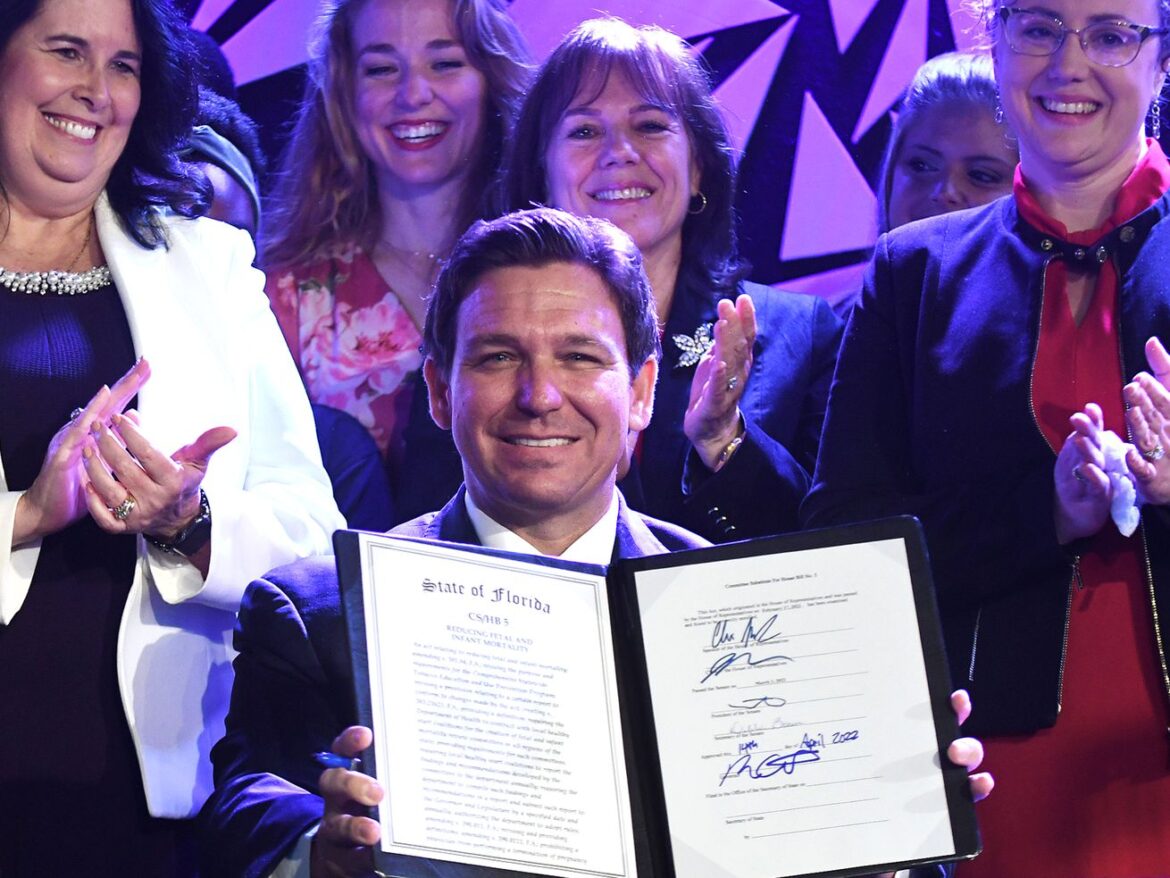Ron DeSantis is poised to sign a measure that would threaten care throughout the South.
Last summer, just days after the US Supreme Court overturned Roe v. Wade, a new law in Florida took effect that banned abortion after 15 weeks of pregnancy, down from the previous legal threshold of 24 weeks.
Now Florida lawmakers are poised to take even more aggressive action against reproductive freedom in the third most populous state, armed with a supermajority of Republicans in both chambers and Gov. Ron DeSantis, who is readying himself to launch a presidential bid.
Less than one month ago, Florida lawmakers introduced parallel bills in both chambers of the state legislature to restrict abortion at six weeks of pregnancy. In practical terms, this is a total ban: Many people do not even know they’re pregnant at six weeks. Even if they are aware, the Florida requirement to obtain an abortion — two in-person doctor visits with a 24-hour waiting period in between — is a challenging logistical burden at 15 weeks and would be nearly impossible at six.
On Monday, the Florida Senate approved the six-week ban, and the House is supposed to vote on its version next week. DeSantis declared last month he’d sign it into law.
The proposed ban would not only decimate what’s left of abortion access for residents in Florida but also significantly curtail care for women across the South, who have been traveling to Florida from their more restrictive states since Roe was overturned last summer. Annie Filkowski, the policy director of Florida Alliance of Planned Parenthood Affiliates, told Vox their clinics have seen nearly four times the patient volume since June, with people seeking abortions from “the surrounding states and the entire Southeast.”
The 15-week ban was already challenged in state court, and the six-week ban, if it passes, would not take effect until after the Florida Supreme Court rules on the legality of the earlier ban. While abortion rights advocates believe they have a strong case, they know their odds are long thanks to a politicized judiciary. DeSantis has stacked the state’s high court with conservative appointees, transforming the bench from a 5-2 liberal majority to a 6-1 conservative one.
Still, advocates say it is imperative that the public understand that, no matter what, abortion care will remain legal up to 15 weeks in Florida, at least until that decision comes down later this summer, even if DeSantis signs a six-week ban into law this month.
“Having an effective date tied to a Supreme Court decision is really hard for the public to understand, and it is intentionally confusing,” said Filkowski.
Florida’s 15-week abortion ban is already being challenged in court
Anabely Lopes was 15 weeks into her pregnancy when her doctors informed her that her fetus had a fatal congenital disorder that would kill the baby shortly after birth. Lopes was devastated, and then soon alarmed when she could find no doctor who would even give her a medically exempt abortion, as the providers all feared being sued. At 16 weeks and three days pregnant, Lopes traveled 1,000 miles to Washington, DC, to end her pregnancy. She later joined Rep. Debbie Wasserman Schultz (D-FL) in February as her guest at the State of the Union, serving as an example of someone denied critical treatment under extreme abortion laws.
Abortion rights advocates have been challenging the 15-week ban as illegal under Florida’s constitution, but the law that barred Lopes from receiving the procedure has remained in effect as the litigation plays out. A decision is expected sometime this summer.
In the meantime, though, the state is trying to go further. If the bill passes and takes effect, as experts think is likely given the aggressive political climate in the Republican-controlled state, it would instantly catapult Florida into the ranks of the most restrictive states in the country on abortion access.
The proposal not only bans abortion after six weeks but also bans abortion by telemedicine, and requires any medication abortion to be dispensed in person, which effectively outlaws mail orders of the pills. (Researchers have affirmed there is no medical need for abortion pills to be administered in the physical presence of a health care provider.) No other state has had a six-week ban with a requirement for two in-person doctors visits and no option for telehealth.
While the Florida Senate’s bill includes exceptions for rape and incest, the proposed legislation would require anyone claiming those exceptions to provide a copy of a police report, medical record, or court order — even though victims often do not involve law enforcement. The executive director of the Florida Council Against Sexual Violence has called the exceptions “meaningless” and “harmful.”
Some anti-abortion activists remain unsatisfied with even these meager, impractical exceptions, and are now lobbying House Republicans to eliminate the rape and incest carveouts altogether.
Six weeks is simply not enough time for the vast majority of people to get abortion care, especially if remote options are off the table. As of 2017, nearly three-quarters of counties in Florida did not have any abortion clinics. In medical terms, pregnancy is measured from the date of the last menstrual period, not from the date of conception, and up to 25 percent of women don’t even have regular menstrual cycles, meaning a missed period wouldn’t signal anything unusual. It can take at least three weeks for a pregnancy hormone to appear on a home pregnancy test, and while blood tests can also confirm pregnancies, Florida health care professionals testified that it can take weeks to months to get an appointment with an OB-GYN, with wait times particularly long for low-income and Black Floridians.
Once a pregnancy is confirmed, a patient, under Florida law, would need to schedule an ultrasound with an abortion provider. Scheduling these appointments takes even more time. Filkowski told Vox wait times at their clinics average about 20 days.
These barriers would prove virtually insurmountable for most people, and even harder for minors in Florida, who are required by law to either get parental consent to end a pregnancy or petition a judge to bypass their parents.
The Republican state senator who sponsored the six-week ban, Erin Grall, conceded a teenager would be unlikely to go through that legal process within six weeks. “I think the purpose of this bill is to say that when there is life, we are going to protect it,” Grall said.
The Senate bill also includes $25 million in new state funding for anti-abortion pregnancy centers, which are typically religiously affiliated clinics that provide women with items like diapers and baby clothes, and counsel them against getting abortions. This represents a more than fivefold increase from the $4.45 million in taxpayer funds Florida already allocates to such centers.
Lacking enough votes to block the Senate bill, Democratic lawmakers tried and failed to amend it. Amendments included religious exemptions (two Jewish state senators argued Judaism encourages abortion to protect the health and safety of the mother, and other religions like Buddhism and Unitarianism allow abortions), an effort to eliminate the state’s 24-hour waiting period, and an exception for women facing mental health risk.
Florida provides critical reproductive health care for people throughout the South
While abortion banned after 15 weeks is far more restrictive than Floridians had to deal with prior to 2022, women in neighboring states like Louisiana, Mississippi, and Alabama have been contending with even stricter abortion rules since the overturn of Roe. As such, many have been traveling to Florida to end their pregnancies.
State data shows 82,192 people got abortions in Florida in 2022, compared to 79,817 in 2021. The increase was largely driven by those coming in from out of state. There were 6,708 non-Floridians who ended pregnancies in Florida in 2022, 38 percent more than the year prior.
If Florida bans abortion after six weeks, people in the South will need to travel even farther for care, and many will likely turn to North Carolina, where it’s currently legal up to 21 weeks.
Stephanie Loraine Pineiro, who leads the reproductive justice group Florida Access Network, told Vox that if the ban takes effect, their work “will be focused on those needing to travel out of state, to wherever is safest and has the least amount of barriers.”
DeSantis is readying himself for the Republican presidential primary
The Republican governor is expected to announce his candidacy for the White House in the coming months, and no doubt expects signing a radically restrictive abortion law will help him in the competitive conservative primary. At least 13 GOP-controlled states have banned most abortions.
Among Florida voters, though, such restrictions are out of step with public opinion. One survey conducted by Florida Atlantic University last year found 67 percent of Floridians said abortion should be legal in all or most cases, while just 12 percent supported a total ban. Another recent survey, led by the Public Religion Research Institute, found 64 percent of Floridians backed abortion in all or most cases.
Abortion rights advocates say they are not surprised to see the aggressive enthusiasm for restricting reproductive rights from DeSantis, even as he worked to avoid commenting on abortion much last year during his campaign.
“This is Ron DeSantis seeing the success other states have had in implementing six-week bans on abortion care, like Texas, Alabama, and Georgia,” said Pineiro. “I’m sure those served as fuel and inspiration for him to say, ‘Oh, it’s already been litigated.’”
Filkowski, of Florida Alliance of Planned Parenthood Affiliates, agreed. “Ron DeSantis has shown from day one a perpetual thirst to have control over our bodies, our lives, our libraries,” she said. “I think we have seen his political maneuvering to give the answer that suits the crowd that’s in front of him. Like, when he was asked about abortion during his campaign, he’d practically run and never gave a full answer. But we are not surprised now.”



